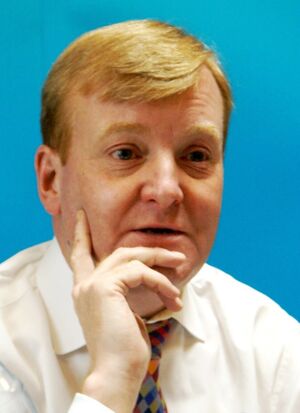Difference between revisions of "Charles Kennedy"
(unstub) |
m (alma mater) |
||
| Line 2: | Line 2: | ||
|wikipedia=https://en.wikipedia.org/wiki/Charles_Kennedy | |wikipedia=https://en.wikipedia.org/wiki/Charles_Kennedy | ||
|image=Charles Kennedy MP (cropped).jpg | |image=Charles Kennedy MP (cropped).jpg | ||
| − | |alma_mater= University of Glasgow, Indiana University | + | |alma_mater=Gordonstoun School,University of Glasgow, Indiana University |
|constitutes=politician | |constitutes=politician | ||
|description= British Liberal Democrat politician leader and 2003 Iraq war opponent, pressured to resign for alcoholism in 2006. | |description= British Liberal Democrat politician leader and 2003 Iraq war opponent, pressured to resign for alcoholism in 2006. | ||
Latest revision as of 10:50, 19 May 2021
(politician) | |
|---|---|
 | |
| Born | 25 November 1959 |
| Died | 1 June 2015 (Age 55) |
| Alma mater | Gordonstoun School, University of Glasgow, Indiana University |
| Member of | WEF/Global Leaders for Tomorrow/2000 |
Charles Peter Kennedy was a British Liberal Democrat politician who was Leader of the Liberal Democrats from 1999 to 2006, and a Member of Parliament (MP) from 1983 to 2015.
Kennedy was elected to the House of Commons in 1983, and after the Alliance parties merged, became President of the Liberal Democrats and, following the resignation of Paddy Ashdown, Leader of the Liberal Democrats. He led the party through two general elections, increasing its number of seats in the House of Commons to their highest level since 1923, and led his party's opposition to the Iraq War. A charismatic and affable speaker in public, he appeared extensively on television during his leadership.
During the latter stages of Kennedy's leadership, there was concern about both his leadership and his health. From December 2005, some within the party were openly questioning his position and calling for a leadership election. On 5 January 2006, he was informed that ITN would be reporting that he had received treatment for alcoholism; he pre-empted the broadcast by admitting that he had had treatment, and resigned as leader the following day. After Menzies Campbell succeeded him as leader, Kennedy remained in office as a backbench MP, where he voted against the formation of the Cameron–Clegg coalition. He died less than a month after being unseated from the House of Commons in 2015.
Contents
Early life
Kennedy was born on 25 November 1959 in the Scottish Highlands town of Inverness, the son of Mary and Ian Kennedy, and grew up in a remote crofter's cottage in the Highlands.[1][2] He had a Roman Catholic upbringing, and was educated at Lochaber High School in Fort William.[3] He went on to study for a Master of Arts degree in Politics and Philosophy at the University of Glasgow. Kennedy first became politically active at university, where he joined the SDP as well as the Dialectic Society.[3] Between 1980 and 1981, Kennedy was President of the Glasgow University Union. He won the Observer Mace debating competition in 1982, speaking with Clark McGinn.[4]
Upon graduation in 1982, Kennedy went to work for BBC Scotland as a journalist.[5] He later received a Fulbright Fellowship which allowed him to carry out research at Indiana University in the United States.[6]
Q&A
The following is an excerpt from a question-and-answer session in which members of the public questioned Kennedy, published in The Independent (UK):
- Q: Is there life for you beyond politics? What are your plans for the future?
- A: I'm relieved to say that there has always been, since I was first elected aged 23 back in 1983, life for me beyond politics. I subscribe to Denis Healey's view that politicians need a hinterland, and I'm fortunate to have several. Since ceasing to be leader I've rejoined The House Magazine (Westminster's weekly publication) as an associate editor. I've also been visiting Russia through the Westminster Foundation for Democracy, offering Lib Dem ideas to opposition parties there.[7]
Affiliations
- Westminster Foundation for Democracy, a UK government regime change outfit.
- The House Magazine
References
- ↑ https://web.archive.org/web/20150602061921/http://www.telegraph.co.uk/news/politics/liberaldemocrats/11645019/charles-kennedy-dies-latest-updates-and-tributes.html
- ↑ https://www.theguardian.com/politics/2015/dec/27/charles-kennedy-remembered-by-ian-hislop
- ↑ a b https://web.archive.org/web/20081211173452/http://news.bbc.co.uk/1/hi/uk_politics/4588062.stm
- ↑ https://web.archive.org/web/20141112045952/http://flynn.debating.net/macewin.htm
- ↑ https://web.archive.org/web/20150528031843/http://www.universitystory.gla.ac.uk/biography/?id=WH1109&type=P
- ↑ https://web.archive.org/web/20150602165356/http://www.independent.co.uk/arts-entertainment/profile-charles-kennedy--the-liberal-party-animal-1100923.html
- ↑ http://news.independent.co.uk/people/profiles/article1205970.ece